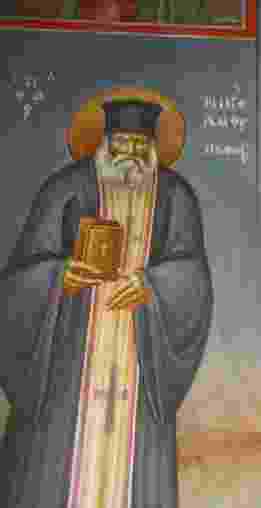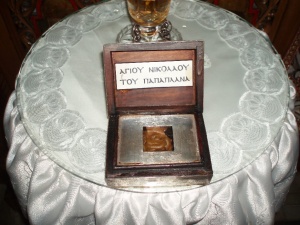Difference between revisions of "Papa-Nicholas (Planas) of Athens"
m (links, minor edit) |
m (Category) |
||
| (21 intermediate revisions by 6 users not shown) | |||
| Line 1: | Line 1: | ||
| − | + | [[Image:NicholasPlanas.JPG|thumb|right|Icon of Papa Nicholas Planas in the church of Panagitsa, Paleo Faliro, Athens]] | |
| − | + | The holy saint '''Papa-Nicholas (Planas)''' of Athens (1851-1932) was officially [[glorification|glorified]] as a [[saint]] by the [[Ecumenical Patriarchate]] of [[Constantinople]] in 1992. He was born in 1851 on the island of Naxos in Greece. His [[feast day]] is celebrated on [[March 2]], except when it falls during [[Great Lent]] period; then it is celebrated on the first Sunday following March 2. As a local saint of [[Metropolis of Paronaxia|Paronaxia]], he is also celebrated on the first Sunday of September, as part of the celebration of the island's five key saints at the Church of St. [[Nikodemus of the Holy Mountain]] on the island of Naxos in Greece. | |
==Life== | ==Life== | ||
| − | + | Papa Nicholas was married and the father of one child. He was married at 17, but his wife died only a few years later, and so he spent the rest of his life in celibacy, his only aspiration being to serve the Church. He was [[ordination|ordained]] a [[deacon]] on [[July 28]], 1879, at the [[Church of the Transfiguration (Plaka, Greece)|Church of the Transfiguration]] in Plaka, Greece, and a [[priest]] on [[March 2]], 1884, at the Church of the Holy Prophet Elisha. | |
| − | + | His focus for over 50 years was to serve daily the [[Divine Liturgy]], vigils, and other services. He never missed a Liturgy and spent most of his time in the very small church of [[Church of St. John the Hunter (Athens, Greece)|Church of St. John the Hunter]] in Athens, Greece. The [[parish]] initially contained only eight families. He never refused to commemorate and pray for anyone when he served, and he carried in his pockets slips of paper containing thousands of names whom he would pray for during the [[proskomedia]] and the Liturgy. | |
| − | + | [[Image:Planas5h.JPG|thumb|right|Holy relics of Papa Nicholas Planas in Athens]] | |
| + | Numerous stories are told of his being lifted in [[prayer]] and of the [[acolyte]]s seing him raised off the ground in front of the altar during the Liturgy. While he would begin Liturgy at eight in the morning, he typically would not finish until two or three in the afternoon. When he was not able to serve at the church of St. John, he would always serve elsewhere. | ||
| + | He was famously absent-minded and was also well known for giving to the poor anything that anyone might give him. He was not an educated man but was considered immensely enlightened, an example of great holiness and humility. | ||
| + | |||
| + | He reposed in February 1932. A new St. John the Hunter Church, which contains his [[relics]], has now been built. | ||
==See also== | ==See also== | ||
*[[Philotheos (Zervakos)]] | *[[Philotheos (Zervakos)]] | ||
*St. [[Nektarios of Aegina]] | *St. [[Nektarios of Aegina]] | ||
| + | *[[St. John the Hunter]] | ||
| − | == | + | ==Hymns== |
| − | + | [[Kontakion]] ([[Tone]] 3) [http://www.serfes.org/lives/stnicholas.htm] | |
:Humble of spirit and pure of heart, illustrious in life and dispassionate of a truth, wast thou, O wise one. Thou didst illumine all by the virtues and dost grant grace unto them that draw nigh unto thee; and by thine intercessions, thou dost heal them that call upon thee, O Father Nicholas. | :Humble of spirit and pure of heart, illustrious in life and dispassionate of a truth, wast thou, O wise one. Thou didst illumine all by the virtues and dost grant grace unto them that draw nigh unto thee; and by thine intercessions, thou dost heal them that call upon thee, O Father Nicholas. | ||
| − | + | [[Megalynarion]] [http://www.serfes.org/lives/stnicholas.htm] | |
| − | :As a simple shepherd of Christ God's lambs, thou didst tend thy flock well on the pasture of piety, | + | :As a simple shepherd of Christ God's lambs, thou didst tend thy flock well on the pasture of piety, nourishing their spirits with ceaseless supplications and leading them to Christ, O wise Father Nicholas. |
| − | nourishing their spirits with ceaseless supplications and leading them to Christ, O wise Father Nicholas. | ||
| − | == | + | ==Further reading== |
| − | + | ''Papa-Nicholas Planas'', by the ''Nun Martha''; translated from Greek and published by [[Holy Transfiguration Monastery (Brookline, Massachusetts)|Holy Transfiguration Monastery]], 1981. | |
| − | ==External | + | ==External links== |
| + | *[http://www.i-m-paronaxias.gr/byzantine-monasteries/nikolaos_planas.html Official Biography of St Nicholas Planas] in Greek by the ([[Metropolis of Paronaxia]], [[Church of Greece]]) | ||
*[http://fr-d-serfes.org/lives/stnicholas.htm Biography of Nicholas (Planas)] by Father Nektarios Serfes | *[http://fr-d-serfes.org/lives/stnicholas.htm Biography of Nicholas (Planas)] by Father Nektarios Serfes | ||
| − | *[http://www.ocf.org/OrthodoxPage/reading/planas.html Fr. Jacob Meyes | + | *[http://www.ocf.org/OrthodoxPage/reading/planas.html Canonisation Announcement] by Fr. Jacob Meyes |
| − | *[http://evlogeite.com/?p=74 Another Modern Saint] | + | *[http://www.roca.org/OA/56/56e.htm The Simple Shepherd - Papa Nicholas Planas] by Fr. Alexey Young (''Orthodox America'') |
| − | + | *[http://evlogeite.com/?p=74 Papa Nicholas Planas: Another Modern Saint] | |
| + | |||
| + | [[Category:Saints]] | ||
| + | [[Category:Greek Saints]] | ||
| + | [[Category:Priests]] | ||
| + | [[Category:20th-century saints]] | ||
| − | [[ | + | [[fr:Nicolas Planas]] |
| − | |||
Revision as of 19:40, October 23, 2012
The holy saint Papa-Nicholas (Planas) of Athens (1851-1932) was officially glorified as a saint by the Ecumenical Patriarchate of Constantinople in 1992. He was born in 1851 on the island of Naxos in Greece. His feast day is celebrated on March 2, except when it falls during Great Lent period; then it is celebrated on the first Sunday following March 2. As a local saint of Paronaxia, he is also celebrated on the first Sunday of September, as part of the celebration of the island's five key saints at the Church of St. Nikodemus of the Holy Mountain on the island of Naxos in Greece.
Life
Papa Nicholas was married and the father of one child. He was married at 17, but his wife died only a few years later, and so he spent the rest of his life in celibacy, his only aspiration being to serve the Church. He was ordained a deacon on July 28, 1879, at the Church of the Transfiguration in Plaka, Greece, and a priest on March 2, 1884, at the Church of the Holy Prophet Elisha.
His focus for over 50 years was to serve daily the Divine Liturgy, vigils, and other services. He never missed a Liturgy and spent most of his time in the very small church of Church of St. John the Hunter in Athens, Greece. The parish initially contained only eight families. He never refused to commemorate and pray for anyone when he served, and he carried in his pockets slips of paper containing thousands of names whom he would pray for during the proskomedia and the Liturgy.
Numerous stories are told of his being lifted in prayer and of the acolytes seing him raised off the ground in front of the altar during the Liturgy. While he would begin Liturgy at eight in the morning, he typically would not finish until two or three in the afternoon. When he was not able to serve at the church of St. John, he would always serve elsewhere.
He was famously absent-minded and was also well known for giving to the poor anything that anyone might give him. He was not an educated man but was considered immensely enlightened, an example of great holiness and humility.
He reposed in February 1932. A new St. John the Hunter Church, which contains his relics, has now been built.
See also
Hymns
- Humble of spirit and pure of heart, illustrious in life and dispassionate of a truth, wast thou, O wise one. Thou didst illumine all by the virtues and dost grant grace unto them that draw nigh unto thee; and by thine intercessions, thou dost heal them that call upon thee, O Father Nicholas.
- As a simple shepherd of Christ God's lambs, thou didst tend thy flock well on the pasture of piety, nourishing their spirits with ceaseless supplications and leading them to Christ, O wise Father Nicholas.
Further reading
Papa-Nicholas Planas, by the Nun Martha; translated from Greek and published by Holy Transfiguration Monastery, 1981.
External links
- Official Biography of St Nicholas Planas in Greek by the (Metropolis of Paronaxia, Church of Greece)
- Biography of Nicholas (Planas) by Father Nektarios Serfes
- Canonisation Announcement by Fr. Jacob Meyes
- The Simple Shepherd - Papa Nicholas Planas by Fr. Alexey Young (Orthodox America)
- Papa Nicholas Planas: Another Modern Saint
Categories > Church History
Categories > Church History
Categories > Church History
Categories > Liturgics > Feasts
Categories > Liturgics > Feasts
Categories > Liturgics > Feasts
Categories > People > Clergy > Priests
Categories > People > Saints
Categories > People > Saints > Greek Saints
Categories > People > Saints > Saints by century > 20th-century saints

